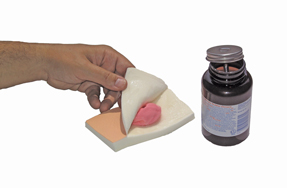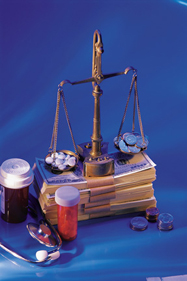Expressive writing could help erase irritable bowel syndrome
A pilot study may have found a new use for an established treatment. Expressive writing, used for other illnesses with a known psychological component, is now being studied to control the symptoms of irritable bowel syndrome.
Given a diagnosis of irritable bowel syndrome (IBS), some patients change their diets, while others may take medication. However, one group of IBS patients recently tried out a new potential therapy: writing.
In an exploratory pilot study, about 100 IBS patients were recruited to write on an online portal about their deepest thoughts, emotions and beliefs regarding their disease and its effects. Expressive writing has been used as psychological treatment for illnesses such as post-traumatic stress disorder, and also experimented with as a supplemental therapy for some medical conditions, including asthma and hypertension.

IBS seemed like a promising application of expressive writing because of its known relation to psychological factors, explained Albena Halpert, MD, a gastroenterologist at Boston Medical Center and lead author of the IBS study, which was published online in June by the American Journal of Gastroenterology. “A lot of nonpharmacological therapies have been tried quite successfully with IBS, including behavioral therapy and hypnosis,” she said.
Her study found some success with writing therapy. Not all the patients followed through on their intention to write: 82 out of 103 completed the four consecutive days of 30-minute writing sessions. But the patients who did write showed significant improvements in their IBS severity and maladaptive cognition related to the disease, which the non-writers (who were also followed for three months) did not.
Anecdotal evidence also indicates the writing program had longer-term effects than one might expect from such a brief intervention. “Patients reported that they dream about it. They think about the writing in the days and weeks after,” said Dr. Halpert.
Psychology and physical illness
Although the exact mechanism by which expressive writing works is uncertain, its effectiveness makes sense based on what is known about the psychological aspects of physical illness, experts said.
“When people have upheavals in their lives, it's also associated with a variety of health problems, both minor problems and also some major problems as well. One thing that writing does is help people to come to terms with this. They sleep better, they worry less, they're able to spend more time with friends,” explained James W. Pennebaker, PhD, chair of the psychology department at the University of Texas, Austin and a researcher of expressive writing.
Even if the only recent upheaval a patient has faced is the development of a disease, the stress of diagnosis and treatment can cause psychological and then physical problems, according to Joshua M. Smyth, PhD, a psychologist at Syracuse University in New York who conducted a trial of expressive writing for asthma and rheumatoid arthritis, published in the Journal of the American Medical Association in April 1999.
“Researchers are using expressive writing in very different ways. Some people are targeting circumstances where people have experienced really deep traumatic or stressful events and are emotionally isolated, with the argument there being that expressive writing provides a safe avenue for expression,” Dr. Smyth said. “Others are using expressive writing in other ways, where it's thought to help someone more generally regulate their emotional state and learn how to be less dysphoric or upset when faced with day-to-day challenges.”
The IBS research falls into the latter category. Expressive writing can be an acceptable treatment for patients who would decline a more aggressive intervention, such as referral to a psychologist, because of the perceived stigma of mental health treatment. It avoids the “I'm not crazy. Are you saying my IBS is all in my head?” conversation, Dr. Smyth explained.
Jumping in
Internists who are frustratingly familiar with that exchange might consider trying expressive writing with their own patients. Although research is ongoing, individual physicians and patients don't have to wait for definitive results before experimenting on their own, the experts agreed. “I think that anybody can jump in right now,” said Dr. Halpert.
“You suggest to the patient that this is a strategy that has been found to be helpful, especially if this is something that they are worried about,” said Dr. Pennebaker.
The precise design of the writing exercise has varied from study to study, and best practices have not been established. Recommendations on the length of writing sessions vary from 15 minutes to 45, usually over three or four days. The IBS study instructed participants to write about their thoughts and feelings about the disease, noting that patients should “feel free to really let go and explore your very deepest emotions and thoughts.”
Dr. Halpert also tried to determine where the writing should take place, but she encountered some differences of opinion. “Patients preferred to write at home. Physicians would like them to write in the waiting room so it's not so long,” she said. “One way to do this is just to have a piece of paper and pen in the waiting room and offer patients [the opportunity] to write if they're interested.”
Another advantage of the waiting room arrangement is the potential distraction. “Maybe the waiting time will be less painful,” said Dr. Halpert.
Expressive writing can improve the patient-physician relationship in other ways, too. “When patients bring their writing to me, I end up studying it. It takes a few minutes or less to read a page and you get so much information. You get information on their coping style, about so many other things that would take you a long time to figure out in the interview,” Dr. Halpert said.
Of course, not every patient benefits from, or even tolerates, expressive writing. “It's no different than a pharmaceutical intervention. It doesn't work for everybody,” said Dr. Smyth.
Some research has indicated that the intervention works best for certain patient populations, including men and people who have difficulty or little opportunity for expressing their emotions. “If they have a network that they can talk about issues with others, they probably don't need it as much as someone who does not have a network,” said Dr. Pennebaker.
The research in this area is ongoing. “We're very much looking at predictors of who benefits. And also who writes, because we know from our current study that some people want to write but they don't actually write,” said Dr. Halpert.
There is one patient population with which internists probably shouldn't run expressive writing experiments—those with severe mental health issues. “If someone is suicidal, having them analyze themselves might cause a brief increase in their negative moods. But someone who's suicidal should probably be referred,” said Dr. Pennebaker.
It's also important to establish the privacy of the writings. Patients should know at the start whether someone is going to read their writings (an audience does affect what writers disclose, research has found) and they should think carefully whether or not it's appropriate to share their writing with family members. While shared writing can have a positive impact on the patient-physician relationship, even totally private writing has potential benefit for patients.
With those caveats in mind, anyone can try expressive writing, Dr. Pennebaker said. “It's a very quick, efficient and free method that can help some people some of the time.”




